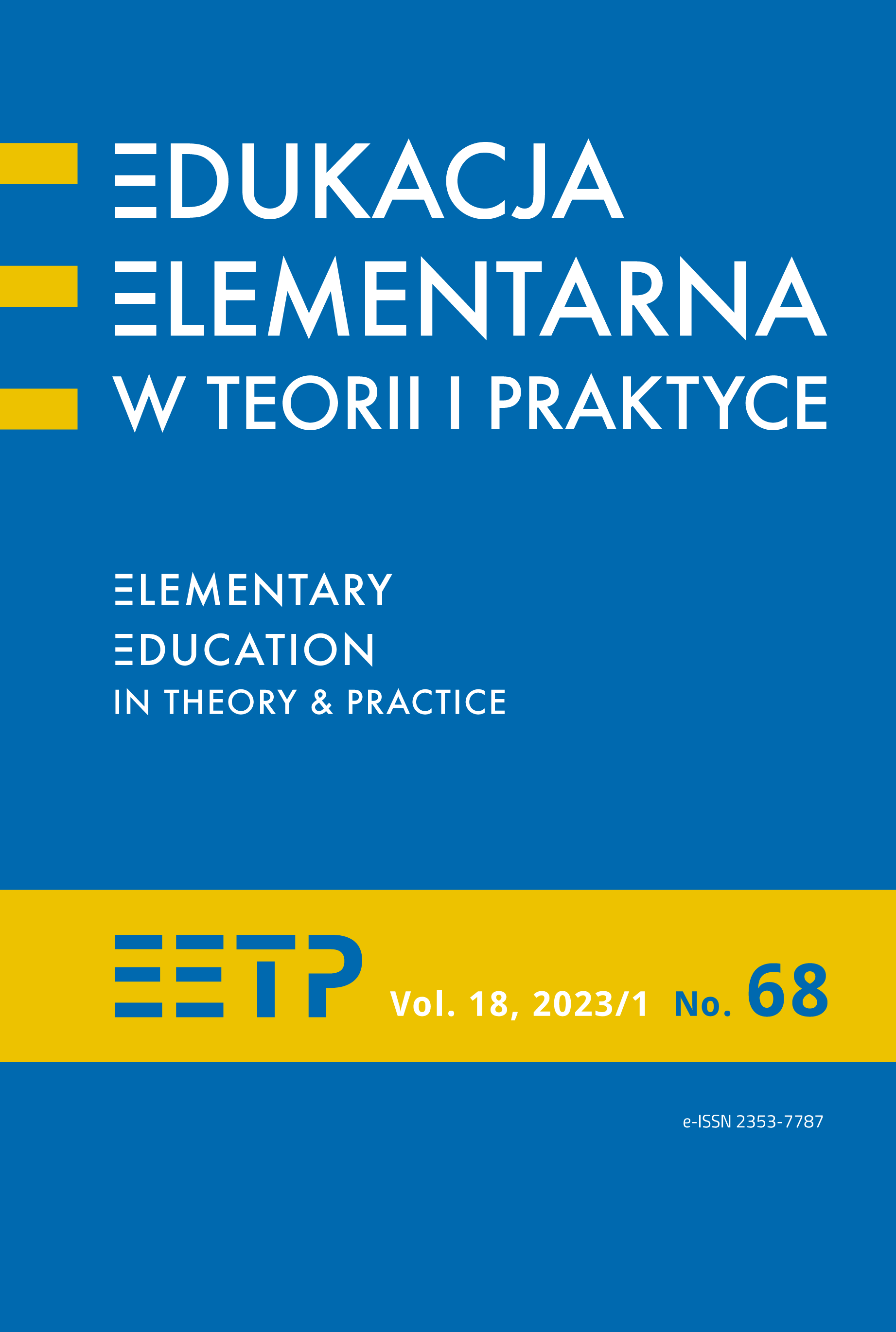'Mantle of Expert (MoE)’ w edukacji przedszkolnej – „Zagrajmy w bibliotekarza!”
Abstrakt
W niniejszej pracy prezentujemy złożoność procesu rozwijania umiejętności dzieci przedszkolnych za pomocą metody „Mantle of Expert” (MoE, „Szaty eksperta”). Jest to specyficzna metoda nauczania oparta na pedagogice dramy. Opracowaniem tej metody zajmowała się głównie Dorothy Heathcote (Heathcote & Bolton, 1995), a rozwojowy potencjał proponowanych przez nią zabaw można zaobserwować na przykładzie zabawy w bibliotekę przeprowadzonej w przedszkolu ‘Central Kindergarten’ w Jászberény (Węgry). Zabawa w bibliotekarza (‘Bibliotekarz MoE’) zostanie opisana po przedstawieniu teoretycznego kontekstu metody MoE, po czym zaprezentujemy badania empiryczne oparte na jakościowej metodzie wywiadu kwestionariuszowego przeprowadzonego z rodzicami (N=11). Badania wstępne koncentrują się na doświadczeniu rodziców dzieci aktywnie uczestniczących w ‘Bibliotekarzu MoE’ na etapie rozpoczynania, tworzenia i rozwijania tej specyficznej zabawy opartej na technice dramy. W oparciu o wyniki badań można powiedzieć, że „zabawa w bibliotekę” wg metody „Mantle of Expert” wywarła pozytywny wpływ na społeczne relacje dzieci i ich umiejętność współpracy w innymi. Ponadto, ich kompetencje cyfrowe i umiejętność posługiwania się narzędziami ICT stały się bardziej świadome.
Bibliografia
Abbots, L. (2007). Mantle of the Expert 2: Training materials and tools. Essex County Council.
Aitken, V. (2013). Dorothy Heathcote’s Mantle of the Expert approach to teaching and learning: A brief introduction. In D. Fraser, V. Aitken & B. Whyte, Connecting curriculum, linking learning (pp. 34–56). NZCER Press.
Bernhardt, R., Kunné Darók, A., & Magyar, Á. (2021). Szakértői játék a komplex fejlesztés tükrében – a „játszási könyvtár” példája. In K. Toma (Ed.), Tervezés és fejlesztés az óvodában (pp. 93–113). Tokaj-Hegyalja Egyetem.
Dewey, J. (1976). Pedagógiai hitvallásom (M. Molnár, Trans.). In J. Dewey, A nevelés jellege és folyamata (pp. 97–112). Tankönyvkiadó.
Farmer, D. (n.d.). Dorothy Heathcote – pioneer of educational drama. https://dramaresource.com/dorothy-heathcote-pioneer-of-educational-drama/
Heathcote, D. (2002). Contexts for active learning – four models to forge links between schooling and society. NATC, Birmingham. http://www.moeplanning.co.uk/wp‐content/uploads/2008/05/dh‐ contexts‐for‐active‐learning.pdf
Heathcote, D., & Bolton, G. (1995). Drama for learning: Dorothy Heathcote’s mantle of the expert approach to education. Heinemann.
Kaposi, L. (2011). Drámajáték az óvoda mindennapjaiban. Drámapedagógiai Magazin, 41(1), 10–12.
Ledőné Dolmány, M., & Szauder, E. (2004). Gondolatok a szakértői drámáról. Drámapedagógiai magazin, 27(1), 8–9.
Molnár, M. (2020). A digitális tanulási környezet pedagógiai tényezői. In: Partnerstädte Überlegungen über die Pädagogie Vechta – Jászberény (pp. 39–50). Eszterházy Károly Egyetem Líceum Kiadó.
Szaszkó, R., & Sinka, A. (2019). The digital teacher: digital tools of motivational pedagogy. In É. Borsos, R. Horák, C. Kovács & Zs. Námesztovszky, Zs. (Eds.), A Magyar Tannyelvű Tanítóképző Kar tudományos konferenciáinak tanulmánygyűjteménye (pp. 197–203). Újvidéki Egyetem Magyar Tannyelvű Tanítóképző Kar.
Van de Water, M., McAvoy, M., & Hunt, K. (2015). Drama and education: Performance methodologies for teaching and learning. Routledge.
Korm. rendelet az Óvodai nevelés országos alapprogramjáról (2012). 363/2012. (XII. 17.). (Hungary). https://net.jogtar.hu/getpdf?docid=a1200363.kor&targetdate=&printTitle=363/2012.+%28XII.+17.%29+Korm.+rendelet
Copyright (c) 2023 Edukacja Elementarna w Teorii i Praktyce

Utwór dostępny jest na licencji Creative Commons Uznanie autorstwa – Bez utworów zależnych 4.0 Międzynarodowe.
1. Autor zgłaszając swój artykuł oświadcza, że jest Autorem artykułu (zwanego dalej Utworem) i:
- przysługują mu wyłączne i nieograniczone prawa autorskie do Utworu,
- jest uprawniony/a do rozporządzania prawami autorskimi do Utworu.
Oświadcza, że nie narusza praw autorskich osób trzecich i praw prawnych.
Oświadcza, że nie występuje żaden konflikt interesów.
2. Udziela Uniwersytetowi Ignatianum w Krakowie nieodpłatnej, niewyłącznej, nieograniczonej terytorialnie licencji do korzystania z Utworu na następujących polach eksploatacji:
- utrwalania utworu w formie papierowej, a także na nośniku cyfrowym lub magnetycznym;
- zwielokrotnienia utworu dowolną techniką, bez ograniczenia ilości wydań i liczby egzemplarzy;
- rozpowszechniania utworu i jego zwielokrotnionych egzemplarzy na jakimkolwiek nośniku, w tym wprowadzenia do obrotu, sprzedaży, użyczenia, najmu;
- wprowadzenia utworu do pamięci komputera;
- rozpowszechniania utworu w sieciach informatycznych, w tym w sieci Internet;
- publicznego wykonania, wystawienia, wyświetlenia, odtworzenia oraz nadawania i reemitowania, a także publicznego udostępniania utworu w taki sposób, aby każdy mógł mieć do niego dostęp w miejscu i czasie przez siebie wybranym;
- w zakresie praw zależnych do Utworu, obejmujących w szczególności prawo do dokonania koniecznych zmian w Utworze, wynikających z opracowania redakcyjnego i metodycznego, a także do dokonania tłumaczenia Utworu na języki obce.
Udzielenie licencji następuje z chwilą przekazania Utworu na rzecz Uniwersytetowi Ignatianum w Krakowie. Uniwersytet Ignatianum w Krakowie jest uprawniony do udzielania dalszych sublicencji do Utworu, w zakresie udzielonego prawa. Licencja jest ograniczona czasowo i zostaje udzielona na okres 15 lat, licząc od daty jej udzielenia.
Wyraża się zgodę i zachęca autorów do publikacji ich tekstu w Internecie (np. w repozytorium instytucji lub na jej stronie internetowej) przed lub podczas procesu składania tekstu jako, że może to prowadzić do korzystnych wymian oraz wcześniejszego i większego cytowania opublikowanego tekstu (Patrz The Effect of Open Access). Zalecamy wykorzystanie dowolnego portalu stowarzyszeń badawczych z niżej wymienionych:




